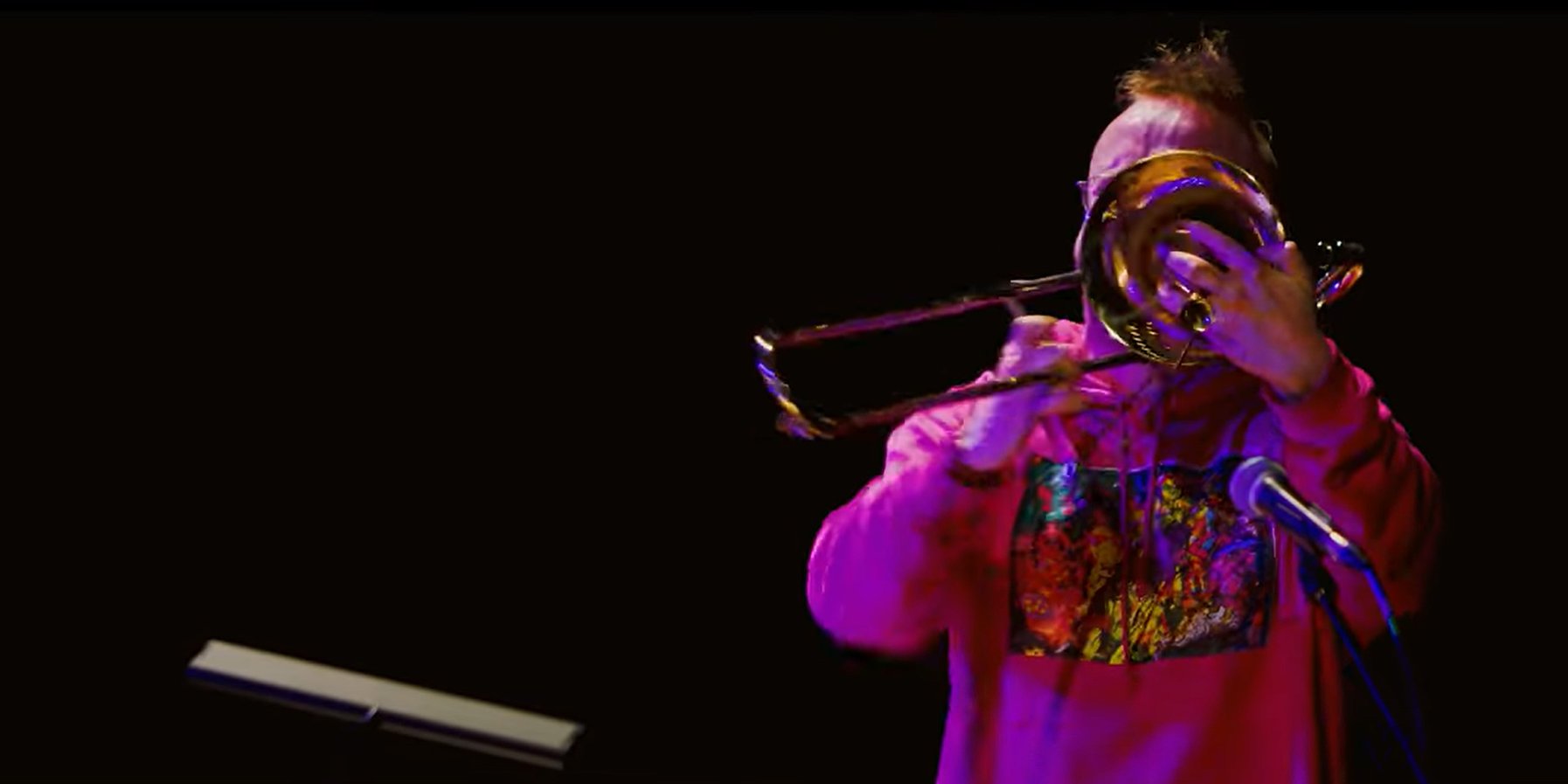Text: Julika von Werder, 30.9.2024
Translation: Robert William Smales
The picture wobbles as he carries his mobile phone around his flat during our Zoom call. »I have one of those typical hoarder-artist flats,« Alex Paxton laughs. You might also say that the English composer and jazz trombonist’s home looks a bit like one of those hidden object books you’d love entering as a child. There are things everywhere that apparently need to be there to be used in sound experiments at any given time. On the table there are collages bursting with colour where Paxton arranges all kinds of odds and ends to create extraordinary visual worlds. He points the camera at individual images on the walls – sources of inspiration, expressions of his artistic self-image. He also proudly shows off his soundbox: a soundproof black wooden box in the room which allows him to make music without disturbing the neighbours. Colourful paper butterflies hang in it – »for feel-good,« he cheerfully explains.
Nothing in his small London flat looks as though it has been organised. To put a positive spin on it, there is creative chaos. And the revelation of these colourful rooms bursting at the seams is not really all that surprising. On the contrary: they mesh perfectly with the brief artistic manifesto Paxton has placed at the top of his website: »Making magic sound stuff«.

Alex Paxton’s magical sound stuff goes by titles such as »ilolli-pop« and »Love Kittens«, and combines everyday sounds with groovy comic sounds, folksy sounds with noise art, human voices with virtuosic chamber music, jazz improvisations with dense orchestral textures. His music, often exuberantly over-the-top, is incredibly captivating and almost inescapable. »World building« is what he is after, the composer reveals. New worlds need to be created – worlds made of magical stuff. »This is the most joyous sound I’ve heard in ages!« gushes a critic from »The New York Times«. »This music brings brightly coloured, loopy joy to our ears. Sweet energy & frantic humour ... It’s jazzy and noisy and oddly serious,« is the take of »The Guardian«.
Alex Paxton in der Elbphilharmonie
Opening concert »Elbphilharmonie Visions«
As part of the Claussen Simon Composition Prize, Alex Paxton is writing a new work for the NDR Elbphilharmonie Orchestra, which is to be premiered at the opening concert of the successful new music festival »Elbphilharmonie Visions« on 7 February 2025, under the direction of chief conductor Alan Gilbert.
Notes that leap out off the score: :Alex Paxton takes concert stages by storm
Born in Manchester in 1990, Alex Paxton studied Jazz and Composition at the Royal Academy of Music and the Royal College of Music in London. He is currently part of various different line-ups, as a jazz trombonist and improvisational artist. Beyond that, he also performs in exciting fusion projects with ensembles such as the Ensemble Modern. He also has a reputation as a composer, particularly in Europe. His works have been performed by the London Symphony Orchestra and the WDR Symphony Orchestra, to name just two. He has released three albums featuring his own music. In 2023 alone he received several prestigious awards, including the Hindemith Prize from the Schleswig-Holstein Music Festival, the Composition Prize from the Ernst von Siemens Music Foundation, and the Claussen Simon Prize – which has led to Paxton now writing a work for the second edition of the »Elbphilharmonie Visions« festival, to be premiered by the NDR Elbphilharmonie Orchestra.
Alan Gilbert, chief conductor of this orchestra, was on the jury and recalls the reading session in the autumn of 2023, when the works of several candidates for the Claussen Simon Prize were played: »Without knowing the name or background of the composer, the notes literally leapt out at me from the score. It was clear that this is a unique compositional voice.« Alex Paxton, on the other hand, has also had good things to say about the Elbphilharmonie Grand Hall since his session: »For me, a space is as important as an instrument,« he says, »and this hall is ideal for playing modern music; clear and warm at the same time.«
Alex paxton & London Sinfonietta: »Candyfolk Space-Drum«
The seriousness of play :Alex Paxton and the world of children
»The world of children means a lot to me,« says Paxton, who until recently was also right at home in the lively classrooms of London primary schools. He taught music in classes of around 30 children between the ages of four and eleven for several years. Now though, regular commitments mean he can no longer fit this into his daily routine. It is not just in retrospect that he feels this job had a considerable influence on him: »It was the perfect complement to my studies, a large piece of the puzzle of my art that I would otherwise have missed out on.« He talks with sincere respect as he recounts how he composed together with the children and developed his own works for them – in search of a musical language that is meaningful not only to him but also to enthusiastic kids just starting school. He is convinced: »Even without all the life experience, they understand the most important thing in music very viscerally. Music can and should work without any prior knowledge.«

As a composer and jazz musician, he also appreciates the importance of playing in the world of children: »Children are so good at taking play seriously. Playing ist the most serious thing of all. It’s extremely important for my art, and actually for the whole of humanity.« His music (and perhaps music in general) should be »world building« – and the dream of creating new worlds is never just a game for Paxton. »Desperately« is the term he likes to use here, not in the sense of »desperate«, but as in »urgent«. He doesn’t see it as a playground that exists in parallel to the real world that you can leave time and again. Instead, he regards play as the foundation for a lively relationship with the world itself.

»Playing ist the most serious thing of all. It’s extremely important for my art, and actually for the whole of humanity.«
Alex Paxton always wanted to be a composer, and he has been composing for almost his whole life. He finds his early works a little rough around the edges these days, but closer to his current self-understanding than the works he later put on paper during his studies. »That’s the hard thing about teaching a craft: in the end, it’s about helping people to get beyond.«
But without craft, it just wouldn’t work either. You need a lot of technical knowledge to be able to think through and shape the music, down to the finest details – especially when it comes to instrumentation. He compares this process in vivid terms with the sight of a beautiful forest, which you can get closer and closer to, right down to the fascinating structure of its individual leaves – and beyond.
The sensation of being alive :Alex Paxton’s music opens up many worlds of association
Alex Paxton’s music also works on different levels and changes each time it is listened to. It is immediately overwhelming with its rousing energy, and yet countless details can be discovered in the thundering flood of sounds, which in turn open up completely new worlds of association. »I'm trying to make music that is as much resonating with my experience as being alive as possible,« he says. And that includes a lot of things: encounters with nature, the hustle and bustle of central London, films, exhibitions, conversations, »not forgetting the violence of of trash, of consumerism and all these things«. The composer, who always wears colourful T-shirts, absorbs all of this like a sponge, using it as material for his creativity machine. It is no coincidence that there is a painting by Hieronymus Bosch hanging on his wall. An artist to whom he also dedicated his first album, »Music for Bosch People«. In a similar way to the fantastically grotesque imagery of the Dutch Renaissance painter, Paxton’s music is composed of sharp details that together create a surreal whole. »In this way, he reduces stylistic pigeonholing to absurdity in a virtuosic and entertaining way,« the »Neue Zeitschrift für Musik« commented.
What are the connection points between his own images and his compositions? Not any particularly close ones, says Paxton: »They may be connected spiritually, but they are not specifically related to the music or vice versa.« They are mostly collages that combine sweets, large splotches of colour and small figures to create a shimmering world. You could call it »magical visual stuff«.

A festival visual for »Elbphilharmonie Visions«
A collage by Alex Paxton also features as the main visual motif of the »Elbphilharmonie Visions« festival. His colour-filled work »Safteypants Full Silver Foil« was photographed in his London apartment for the feature.
Artistic co-existence :Alex Paxton looks forward to the music of the future
One question from our conversation was so important to him that he sent me a follow-up email shortly after our meeting: What does he think music will sound like in 20 to 30 years? He can’t and won’t answer that. But he can’t emphasize enough that he is incredibly excited about it. And incredibly confident. »There are so many fascinating things happening all at once: I’m just as interested in the new sounds from trash TV as I am in teenage culture and pop music, in the releases of the brilliant label Nyege Nyege Tapes in Uganda, or what a lonely teenager puts together on Spotify tracks in their room.« Preserving the canon– no thanks. Streaming services – »world-changing«. He doesn’t think music history should ever be written in linear strands; Alex Paxton is a great advocate of unconditional artistic co-existence. Of course, quality control is still required: »I often compare music to a dish: what would this music taste like as food, and does it make any sense?« He likes cooking, but says he isn’t very good at it.
I can’t adequately describe what Alex Paxton’s music tastes like. But it is worth trying. And you should make sure you’re hungry.
This article appeared in the Elbphilharmonie magazine (Issue 1/25).
- Elbphilharmonie Kaistudio 1
Alex Paxton / Music for Bosch People
After Work Concert with Alex Paxton – Elbphilharmonie PLUS / Elbphilharmonie Visions
Past Concert - Elbphilharmonie Großer Saal
NDR Elbphilharmonie Orchestra / MDR-Rundfunkchor / NDR Vokalensemble / Alan Gilbert
Visions 1: Alex Paxton / Bernd Richard Deutsch
Past Concert









